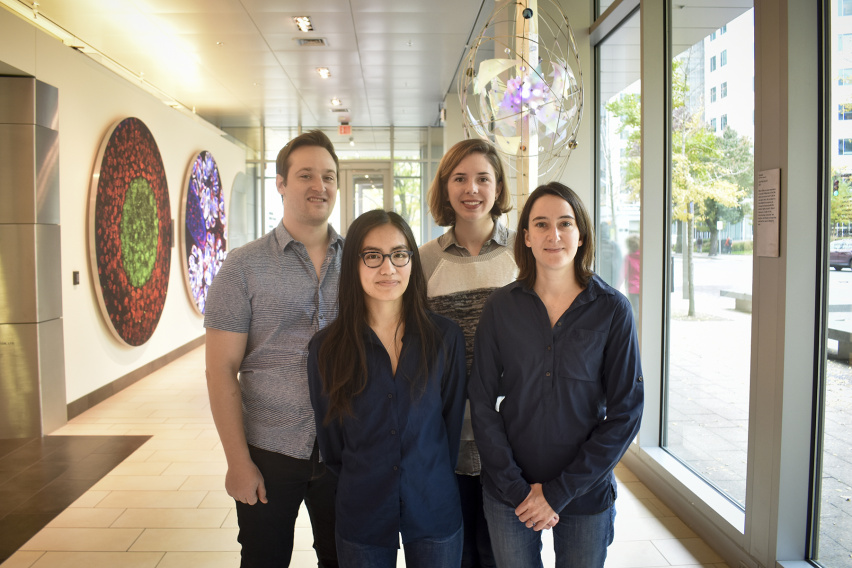
Left to right: Peter Westcott, Kim Nguyen, Shelby Doyle, and Amanda Whipple
MIT Koch Institute
November 20, 2018
The KI is proud to congratulate the first annual Peter Karches Mentorship Prize winners. Each year, the prize will be awarded to up to four postdocs or graduate students in recognition of the important role trainees play in the mentorship of high school and undergraduate students working in KI laboratories.
This year's winners are:
Shelby Doyle is a PhD candidate in Biological Engineering in Professor Angela Koehler’s lab. Prior to joining the MIT community, Shelby earned her Bachelor of Science in biological and agricultural engineering from Louisiana State University and completed an undergraduate thesis focused on computational fluid dynamics and microfluidic systems. At the Koch Institute, her thesis work leverages chemical biology techniques and high-throughput screening approaches for targeting transcription factors in cancer, with an emphasis on therapeutic targets in prostate and breast cancer. Shelby has been the long-term mentor of two undergraduate students and has mentored three visiting high school students.
Kim Nguyen studied biochemistry at University of California at Berkeley and got started in research during a summer internship at UC San Diego, where she worked to characterize members of a novel family of secreted protein kinases. In Professor Stefani Spranger’s lab at the Koch Institute, Kim studies signal transduction in the context of cancer immunology. Her mentors have been key to her successes in the lab and also instrumental to keeping her in the field of science. In Professor Spranger, Kim has found another mentor who understands how important these relationships are to fostering rewarding experiences in science and is grateful to have the opportunity to mentor others.
Peter Westcott did his graduate training at UC San Francisco, where he used next-generation sequencing to define the landscape of mutations in mouse models of lung cancer. As a postdoc in Professor Tyler Jacks’s laboratory, Peter has developed novel mouse models to dissect mechanisms of immune evasion in lung and colon cancer. He has experienced a range of mentorship styles throughout his training, and appreciates the formative role of an engaged and supportive mentor, particularly at critical junctures when confidence may be low and the path ahead daunting. To Peter, the greatest reward of mentorship is sharing his excitement for research and fanning those sparks of curiosity and passion in his students.
Amanda Whipple completed her PhD at Baylor College of Medicine where she generated a mouse model to study dysregulation of an RNA binding protein in myotonic dystrophy. Following her interest for RNA-mediated disease and the potential to target RNA as disease therapy, she then performed postdoctoral work at Ionis Pharmaceuticals, where she designed a novel therapeutic approach for an imprinted disorder by targeting a long non-coding RNA. Now, in Professor Phillip Sharp’s laboratory at the Koch Institute, Amanda seeks to understand the function of imprinted, non-coding RNAs during normal and dysregulated neurodevelopment. Next summer, she will continue her research as an assistant professor at Harvard University, and is looking forward to her increased capacity to mentor the next generation of researchers.
The prize was created to celebrate the extraordinary legacy of Peter Karches, who spent his career at Morgan Stanley, rising to become president and chief operating officer of Morgan Stanley’s institutional securities and investment banking group. A passionate horse racing fan, he bred and raced thoroughbreds, and co-chaired the New York Racing Association. After a long battle with chronic lymphocytic leukemia, Mr. Karches passed away in April 2006. James Goodwin, a close family friend of the Karches family, established the prize in honor of Mr. Karches's generosity, intellect, and steadfast commitment to family and friends. James Goodwin, a close family friend of the Karches family, established the prize in honor of Mr. Karches's generosity, intellect, and steadfast commitment to family and friends.